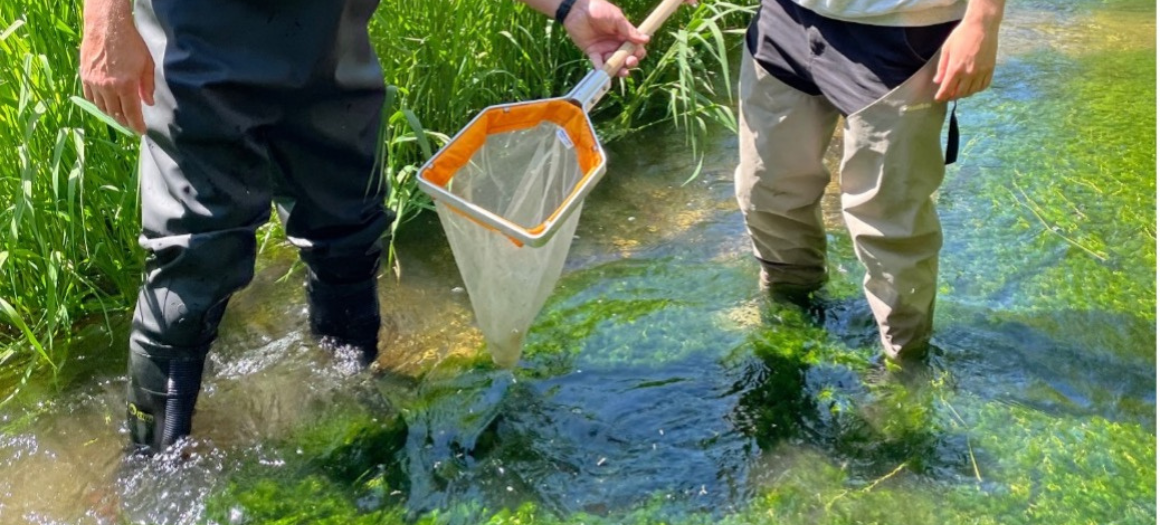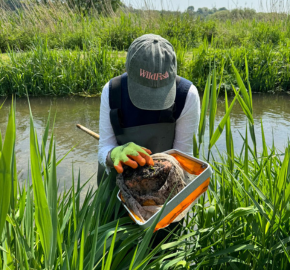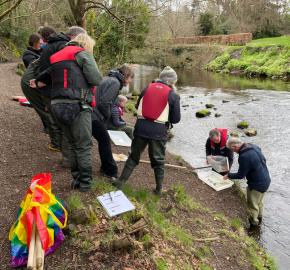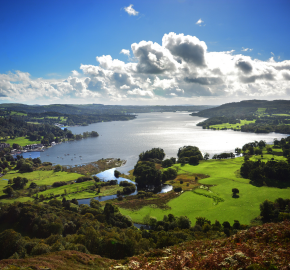A day in the life of… a SmartRivers volunteer

Earlier this year, we sent our Water Policy Officer, James Overington, out with a team of volunteers on the River Chess – our latest addition to the SmartRivers project.
The River Chess: a SmartRivers hub
The Chess SmartRivers Hub was setup earlier this year by the Chiltern Conservation Board. Led by Dr Kate Heppell, the group has a citizen-science focus, and this was their first SmartRivers training day on the river. An established organisation, the Chiltern Conservation Board, already have several live projects on the river.
Why does the River Chess need protection?
The Chess is a small chalk stream flowing from Chesham in Buckinghamshire to its confluence with the River Colne in Hertfordshire. It is also a river under threat – which is hard to believe when you take in its idyllic beauty from the riverbank.
The Water Framework Directive classified the River Chess with ‘moderate’ overall status which means that it is failing to meet its ecological targets.
The river continues to be classified with ‘poor’ phosphorous status. This hasn’t changed since 2010. The Environment Agency estimated that 96% of the total reactive phosphorous entering the river is discharged from Chesham sewage treatment works.
During our lunch-break, Paul explained that the River Chess Association (RCA) were also working hard to combat invasive signal crayfish and the development of an intensive poultry farm.
The importance of local support
On arrival, we were funnelled into a well-stocked presentation room, and plied with coffee and cakes!
The other group members were locals, all deeply passionate about the Chess. Nearly all of them were members of local associations, including the Chairman of the RCA Paul Jennings. It became obvious, from early introductions, that the people gathered for this training had a longstanding interest in the Chess and were actively campaigning on behalf of their community. SmartRivers data will be another source of information available to help support their local lobbying activity.
The local members of the group were a tremendous advocate for the River Chess and determined to improve its condition.
Getting to know the river
I’ve never really appreciated the strength of a flowing river until I was knee deep in the River Chess.
Beautifully tranquil from the bankside, in the river itself nothing stood still. I cautiously kept my balance while thick swathes of water crowfoot hugged my ankles.
SmartRivers instructor, Matt Owen-Farmer – who is confidently at ease in the river – was our guide and trainer for the day. Matt plays one part of a well-balanced ‘double act’ with Richard Osmond. Richard, where possible, is able to remain dry, calling on his lengthy experience to identify species from the safety of the riverbank.
SmartRivers data supporting local conservation
The training began indoors with an introductory presentation that covered our agenda for the day and explained how the SmartRivers data would be used.
Matt and Richard’s enthusiasm for aquatic insects is infectious. Regaling us with amusing anecdotes of sampling days gone awry, both Matt and Richard prefer a more practical approach to teaching. Needless to say we were down by the river’s edge before 10am.
Over the next six hours we were let loose in the river to carry out invertebrate sampling in accordance with the standardised SmartRivers methodology. This was all conducted under the watchful eyes of Matt and Richard, who had collected the professional samples beforehand.
The sampling process
Assessing the river site
The process began with mentally partitioning a 10-meter stretch of river and calculating the area cover of substrates and submerged plants.
Kick-sweep sample
We then conducted 12 kick samples over three minutes, making sure to sample representatively, followed by a 60 second hand sample.
Preparing the sample for identification
The samples are then filtered and preserved, before being separated according to size, ready for identification. As expected, Richard was in his element for the identification part of the process.
Analysis
The Chess samples, collected by Matt and Richard, were sent off to the laboratory for analysis. The results will be published in the upcoming months and will add new clarity to the pressures affecting the Chess.
How is SmartRivers data used?
When a sufficient amount of data has been collated it will be used as evidence to engage with local agencies and press them to take action over the pinpointed pressures.
The Chess is one of 24 SmartRivers hubs sampling 143 river sites across the UK. This network of hubs continues to grow, with 86 volunteers trained in 2021.
SmartRivers applies a bottom-up approach, empowering and training local people to take action. The local data it generates provides us with evidence to begin applying pressure nationally.
It is often said “you never walk in the same river twice”. With local support and national change this river will be able to purge itself of the current pressures. With change, the River Chess and many others like it, will be capable of supporting abundant wildlife long into the future.




